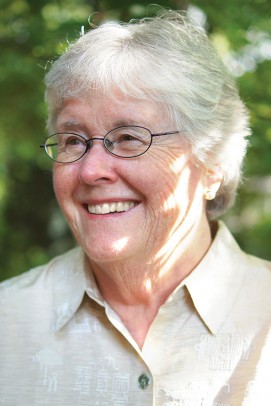UIC Alumni Award winner brings health, empowerment to women

“The disparities in maternal and newborn health care around the world are appalling,” says Mary Ellen Stratton, senior maternal health adviser of USAID.
University of Illinois at Chicago alumna Mary Ellen Stanton states her goals simply.
“First, to live in a world where women can have the number of children they want, and are healthy enough to take care of them, and second, to see a time when a woman’s chance of surviving birth isn’t dependent on the country where she lives,” she says.
Stanton, a resident of McLean, Virginia, is senior maternal health adviser for USAID (the U.S. Agency for International Development), a government agency that works to end poverty around the world. The 1975 graduate of the UIC College of Nursing‘s nurse midwifery program received the 2015 UIC Alumni Humanitarian Award Sept. 18, presented by UIC Chancellor Michael Amiridis at a luncheon on campus.
Before enrolling in UIC’s nurse midwifery program, Stanton practiced nursing in a variety of settings — New York City, a Biafran refugee camp, rural Kentucky, Costa Rica.
“I met women, some with more than a dozen children, who really had no opportunity or resources to attend to themselves,” she says.
At UIC, “I had extraordinary teachers,” recalls Stanton. “They were scientists and scholars, pioneers in clinical practice and leaders in the profession. They were wise and compassionate, and inspired me to do far more than I thought possible.’’
In 1994, after practicing and teaching in the U.S., Ivory Coast, Swaziland and India, Stanton joined USAID.
“The world had just begun to wake up to the fact that women die during childbirth every year, in unconscionable numbers, of preventable causes,” she says. “The disparities in maternal and newborn health care around the world are appalling. Over a lifetime, women in sub-Saharan Africa are 100 times more likely to die in childbirth than women in more developed countries.”
The first steps to ameliorating this condition involve education and treatment — educating women about family planning, improving basic maternity care and managing childbirth complications that are seldom lethal in the West but far more perilous in developing countries. Beyond that, however, are deep cultural issues.
“In many countries, there are problems stemming from tribal, class and caste prejudice,” says Stanton. “A woman will find out about the clinic and come for care, but because she is from the wrong group, she is ignored, or worse.
“Many women become demoralized and give up on the health services. Some decide to have the next baby at home and can end up dying from a routine problem that could have been managed in a hospital or clinic.”
Another issue commanding Stanton’s attention is the problem of fistulas. During prolonged labor, a hole can open between two of the mother’s organs, resulting in life-long incontinence. The condition affects as many as 2 million women, often resulting in them being ostracized from family and community.
“It’s a horrendous disability,’’ says Stanton, “but fistulas can be surgically repaired. We’re working to reduce the stigma and to teach more surgeons how to perform this procedure.”
The ultimate goal, says Stanton, is to empower women.
“Survival is just the start,” she says. “We have to help and support women to achieve not only good physical and mental health, but to take direction of their lives.”
